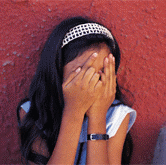 So this has been the new "big thing "in Bahrain for the past couple of weeks. Shaikh Essa Qasem, head of the "Olama" Islamic Council , had given a Friday sermon at Al-Sadiq mosque in Duraz 2 weeks ago in which he deamonized "seculars" and "secularism" as enemies of Islam and of the people of Bahrain. "Down with the seculars!", the crowds shouted..
So this has been the new "big thing "in Bahrain for the past couple of weeks. Shaikh Essa Qasem, head of the "Olama" Islamic Council , had given a Friday sermon at Al-Sadiq mosque in Duraz 2 weeks ago in which he deamonized "seculars" and "secularism" as enemies of Islam and of the people of Bahrain. "Down with the seculars!", the crowds shouted..As usual, a religious message had a political background. The Shaikh's message comes following the controversy over the 1% unemployment insurance tax scheme, which the Olama council had decreed un-Islamic, as it compells employees to pay contribution against their will. The so-called seculars, and this term is used loosely, as all of them had indicated their committment to Islam as the official state religion, disagreed. Some figures in Wa'ad and parliament had called on the Olama Council to refrain from rushing to use religious fatwas to silence the debate on this issue. Apparently, this call had struck a nerve. In that sermon and those that followed, Shaikh Qassim continued to accuse the "seculars" of waging a war on Islam and called upon his followers to fight the "deamon."
Now, many writers, both Shia and Sunnis, religious and otherwise, have written in condemnation of this newly-waged "war". Rightfully, they pointed out that calling upon the Shi'i street to fight a secular imaginary deamon is in effect the perfect distraction from such critical issues as government corruption, unemployment, land distribution, sea reclamation, housing, and destruction of Tubli bay, to say the least. Moreover, one must point out that regardless of what the Shaikh considers as secularism, it cannot be denied that even if what he described existed, the secular movement in Bahrain (mainly Wa'ad) is (1) too weak to be deamonized and (2) The Shia's (and Wefaq's) ally in government opposition-- meaning it makes absolutely no sense to fight it. It is hard to defend Shaikh Qassim's statements. They are, to say the least, divisive at a time when the Olama Council itself stresses building unity within Bahrain.
But another interesting aspect in all of this is the crisis Al-Wefaq is facing. Basically, this anti-secular message can be seen as directed towards 3 main targets: Wa'ad, Aziz Abul, and Majid Al-Alawi-- two of which are established Wefaq allies. Moreover, the "Shirazi" line of Al-Amal Al-Islamic [not in the Olama Council], represented by Sh. Al-Mahfouz has weighed in against Sh. Qassem's message.
Al-Wefaq is being pressured on more than one level. First, Wefaq cannot hide that its own MPs have voted in favor of the 1% tax law in parliament. It was only in June, around six months later, that they switched gears and condemned the law as a "government trick," raising even more questions about their competence as MPs. Now, Al-Wefaq's very legitimacy, and not only political tactics, is being questioned in light of the Olama Council's condemnation.* On the other hand, its Sunni oppositionist "seculars", as subtly as Ebrahim Sharif put it, are looking to Wefaq for a stand in support of its allies. So far, Wefaq has been keeping an uncomfortable silence..
To be continued...
* The Council, esp. Sh. Essa Qassim, has been long considered Wefaq's spiritual guide and its "Islamic-source-of-legitimacy"

3 comments:
I salute you for your deep and insightful analysis. Keep up the good work
Besides using religion as an excuse to turn anything in their favor (ie, this is against islam, FIGHT IT!), the movements in Bahrain have started reaching a point where so many groups are pulling on different sides of the table, and no one is getting anywhere. I'm very frustrated that everything here seems to be based on religon now. I don't mind religion at all, but if you base everything on it and throw in a good measure of extremism, you're going to start moving backwards. Why are our MP's mainly religious figures? Why can't our parliment be divided, a number of religious figures, a number of architects, a number of doctors, lawyers, teachers, etc. We need a full mix of the society, and not just the "religious side". Oh, and people need to loosen the hell up because not everything has to do with religion.
Well it is still blurry where Wefaq stands in all of this..
They are partly lucky because it is summer and thigs will probably quiet down in the next month. It would be fair to say that we have a very short-term political memory..
Ammar: I believe religion should stay out of politics, but I also feel it's a lost cause to try and promote this idea in Bahrain, at least for now!
Post a Comment